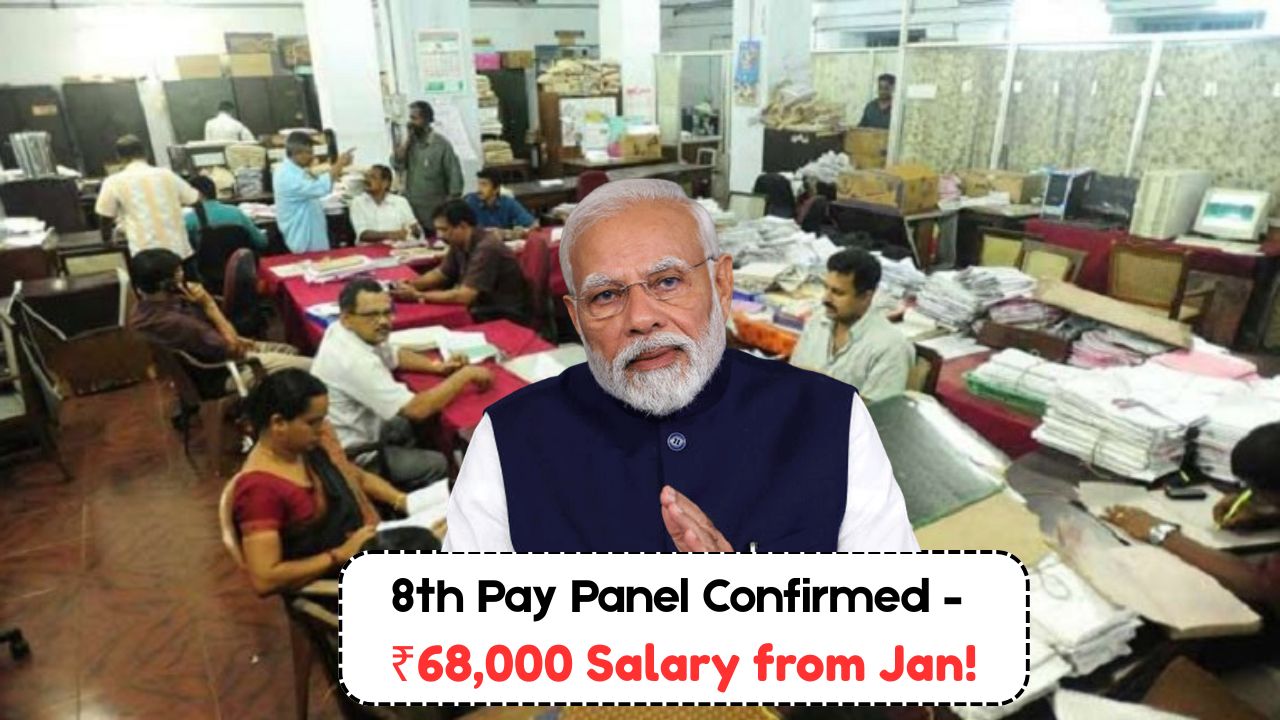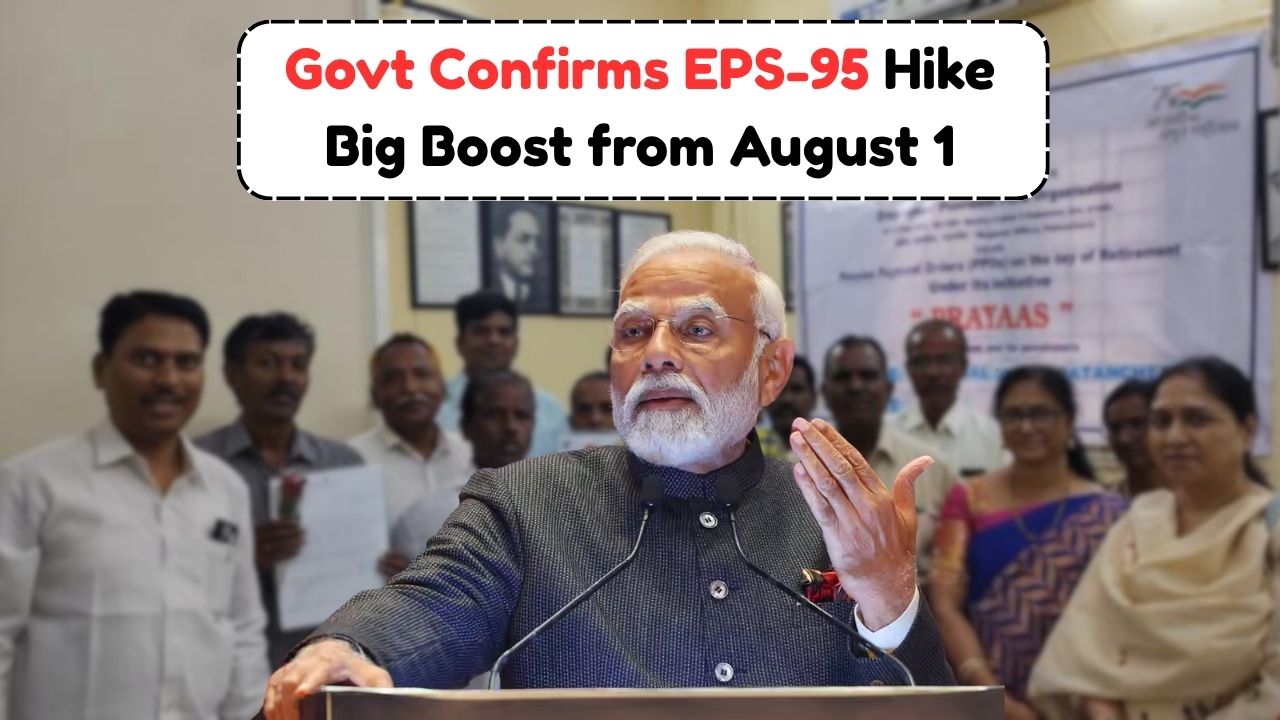8th Pay Commission – In a historic move set to impact more than 1 crore central government employees and pensioners, the Government of India has officially greenlit the long-awaited 8th Pay Commission. Starting January 2026, employees will receive a minimum basic salary of ₹68,000 along with a 38% Dearness Allowance (DA), festive bonuses, and revised pension structures. This decision comes as a major relief for lakhs of families grappling with rising living costs and inflation. The announcement of the 8th Pay Commission is being seen as a political masterstroke in the run-up to the 2026 general elections. It aims to boost the morale of public sector workers, improve retention, and align salaries with the current economic demands. The commission’s recommendations are set to overhaul salary structures, retirement benefits, and allowances for various departments.
What is the 8th Pay Commission and Why Is It Important?
The Pay Commission is an administrative mechanism established periodically by the Government of India to review and revise the salary structure of central government employees, defence personnel, and pensioners. The 8th Pay Commission has now been confirmed and will be implemented from January 2026.
 Lost Your Driving License? Download Digital Copy Instantly – DigiLocker Now Fully Integrated
Lost Your Driving License? Download Digital Copy Instantly – DigiLocker Now Fully Integrated
Key reasons why the 8th Pay Commission matters:
- It affects over 1 crore employees and pensioners across India.
- It ensures salary adjustments are in line with the cost of living.
- It helps maintain parity and fairness across departments.
- It significantly influences economic demand through enhanced purchasing power.
- It is often linked with election cycles for political impact.
Key Features of the 8th Pay Commission Recommendations
The 8th Pay Commission introduces a new base pay, increased DA, and several allowances and bonuses. Here’s what you need to know:
- Minimum Basic Salary: Increased to ₹68,000 per month
- Dearness Allowance (DA): Revised to 38%
- House Rent Allowance (HRA): Recalibrated with metro and non-metro rates
- Transport Allowance: Additional benefits for higher-grade pay holders
- Pension Revision: Improved slabs and minimum guaranteed pension
- Performance-Linked Bonus: Introduced for select ministries
- Annual Increment: Retained at 3% with additional hike for performers
- Child Education Allowance: Increased to ₹4,000 per child
Revised Pay Structure and Salary Matrix (Post-8th Pay Commission)
The salary structure has been revamped for various Pay Levels to reflect the new pay matrix. Here’s an indicative table showing the revised base pay for different levels:
| Pay Level | Previous Basic Pay | Revised Basic Pay | 38% DA Amount | Gross Salary (Estimated) |
|---|---|---|---|---|
| Level 1 | ₹18,000 | ₹68,000 | ₹25,840 | ₹93,840 |
| Level 4 | ₹25,500 | ₹75,500 | ₹28,690 | ₹1,04,190 |
| Level 6 | ₹35,400 | ₹88,400 | ₹33,592 | ₹1,21,992 |
| Level 7 | ₹44,900 | ₹97,800 | ₹37,164 | ₹1,34,964 |
| Level 10 | ₹56,100 | ₹1,10,500 | ₹41,990 | ₹1,52,490 |
| Level 11 | ₹67,700 | ₹1,20,600 | ₹45,828 | ₹1,66,428 |
| Level 13 | ₹1,18,500 | ₹1,60,000 | ₹60,800 | ₹2,20,800 |
| Level 14 | ₹1,44,200 | ₹1,85,000 | ₹70,300 | ₹2,55,300 |
Benefits for Pensioners and Retirees under 8th CPC
The 8th Pay Commission is not just a windfall for existing employees but also includes a massive uplift for pensioners. The revised pension rules aim to provide a more dignified post-retirement life.
- Minimum Monthly Pension: Proposed to be ₹34,000
- DA on Pension: Increased to 38%, revised bi-annually
- Family Pension: Enhanced minimum to ₹21,000
- Gratuity Ceiling: Raised from ₹20 lakh to ₹25 lakh
- Commutation Value: Adjusted in line with inflation
- Medical Reimbursement: Increased allowance under CGHS scheme
- Revised Pay Matrix: Pensions to be recalculated using new salary slabs
Special Festival Bonus and Increment Changes
Apart from the revised salary structure, the Government has announced special bonus packages to boost employee morale during the festive season.
- Diwali Bonus: Flat ₹20,000 bonus to be disbursed in October 2026
- Performance Bonus: Based on appraisal reports; ranges between ₹25,000–₹40,000
- One-Time Arrear Payment: Lump sum disbursal of arrears for Jan–June 2026
- Annual Increment Cycle: Effective every July with scope for double increment based on review
- Additional Leave Benefits: Optional earned leave encashment during festival seasons
How the 8th Pay Commission Will Impact India’s Economy
Experts believe the rollout of the 8th Pay Commission will create a ripple effect across multiple sectors, influencing inflation, demand, savings, and consumption.
- Boost to FMCG and Retail: With increased disposable income, consumer spending is likely to rise
- Housing Demand: HRA and DA revision expected to push housing purchases in Tier-2/3 cities
- Automobile and Electronics: Large-ticket purchases expected to increase due to bonus payouts
- Banking and Insurance Uptake: More savings and term insurance purchases by salaried class
- Regional Economies: State governments likely to revise their own pay matrices based on central changes
Implementation Timeline and Key Deadlines
The Government has provided a structured rollout plan for the new pay regime to ensure smooth implementation across departments.
| Timeline | Action Item |
|---|---|
| August 2025 | Final report of 8th CPC to be submitted |
| September–October 25 | Inter-ministerial review and budget allocation |
| November 2025 | Cabinet approval and notification |
| December 2025 | Salary and pension software update |
| January 2026 | Revised salaries credited with January salary |
| February 2026 | Bonus payout and arrears settlement |
| March 2026 | Revised pension and DA for retirees |
Departments and Sectors That Benefit the Most
While the pay revision covers all central government employees, some departments stand to benefit more due to their essential roles and higher risk factors.
- Defence Forces and CAPFs: Better allowances and risk-based pay
- Railways and Postal Department: Special focus on rural connectivity roles
- Education Sector: UGC Pay Scale realignment with 8th CPC
- Health Workers (CGHS): Improved allowances and night shift compensations
- Revenue and Taxation: Performance-based bonus implementation
The 8th Pay Commission is a landmark reform in India’s public sector wage structure, promising to uplift over 1 crore employees and pensioners starting January 2026. With revised base salaries, DA, bonuses, and allowances, the government aims to enhance job satisfaction, boost economic consumption, and retain talent in critical departments. As the country prepares for the upcoming elections, this move may play a crucial role in shaping both public sentiment and economic momentum.
FAQs
Q1. When will the 8th Pay Commission come into effect?
The new pay structure will be implemented starting January 2026, with salaries and pensions revised accordingly.
Q2. What is the new minimum basic salary as per the 8th CPC?
The revised minimum basic salary is ₹68,000 per month, up from the current ₹18,000.
Q3. How much DA will be given under the 8th Pay Commission?
Dearness Allowance (DA) has been fixed at 38%, with further adjustments expected every 6 months.
Q4. Will pensioners also benefit from the 8th Pay Commission?
Yes, pensioners will receive enhanced monthly pensions, revised DA, family pension hikes, and improved medical reimbursements.
Q5. What bonuses have been announced with the new pay commission?
Employees will get a flat Diwali bonus of ₹20,000, performance-based bonuses up to ₹40,000, and one-time arrears payment.









